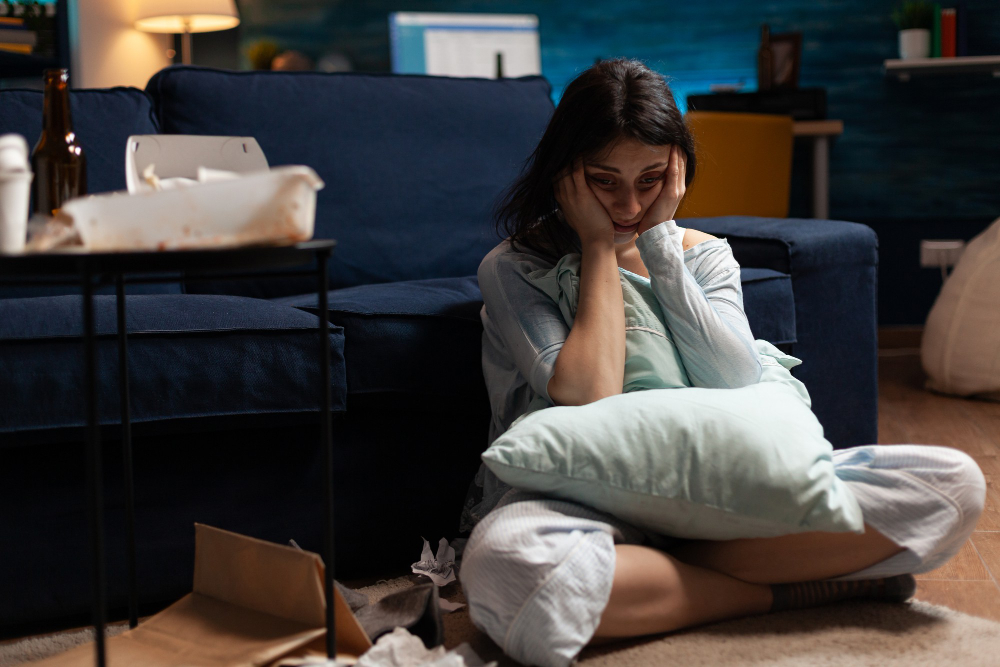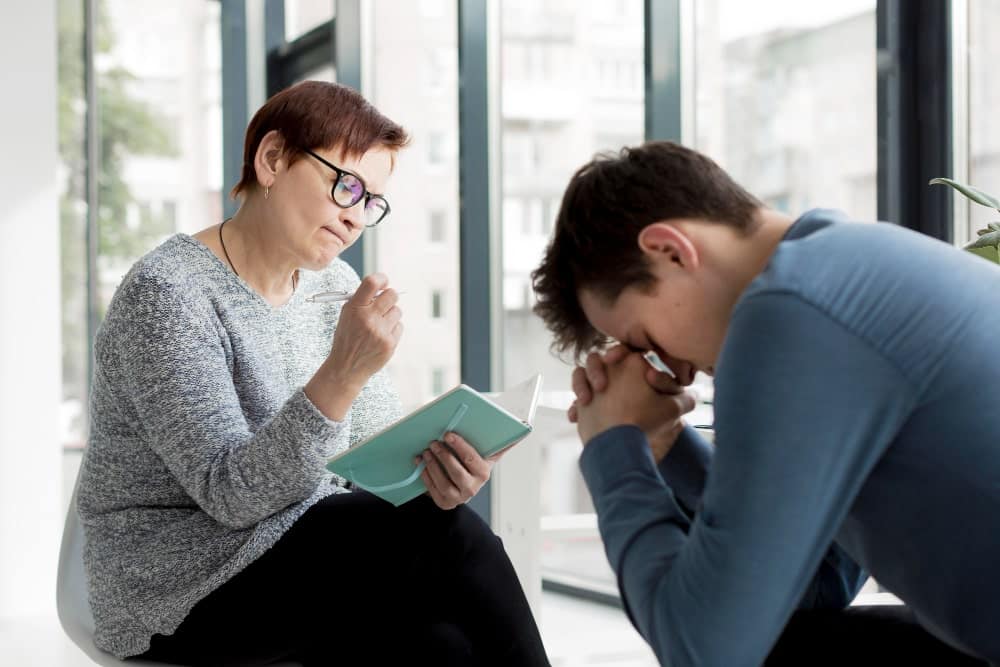Anxiety refers to a person’s response to a threat or danger. Each experience of anxiety entails a perception of risk, thoughts of harm, and a physiological response. The associated behaviours exhibit the activation of fight or flight. The situation of threat might be mild or catastrophic. Nevertheless, the experience in each case is different for every individual (Moss, 2002). Anxiety can be due to exam stress, relationship or marriage-related issues, Financial Concerns, or lack of Intimacy. Dr Nisha Khanna is a renowned Psychologist in Delhi NCR, India and has dealt with Anxiety treatment for the last two decades.
Signs of Anxiety
A few common signs of anxiety include- rapid heart rate and rapid breathing, sweating, nausea and upset stomach, trembling, dry mouth, feeling dizzy or lightheaded, tight or painful chest, numbness or tingling sensation, choking sensation, sleep disturbances, muscle tension, difficulty in concentration and irritability. Along with affecting the body, anxiety also affects thoughts and behaviours. Thus, the three parts to anxiety symptoms are:
Physical Symptoms of Anxiety
Physical symptoms include how the body responds, such as sweating, dizziness, muscle tension, increased heart rate, shortness of breath, nausea, sleep disturbances and nightmares, irritability, hypervigilance for danger, restlessness, and difficulty concentrating.
Cognitive Symptoms of Anxiety
Cognitive symptoms or thoughts include what we think or say negatively to ourselves, such as “something bad is going to happen,” “I am going to die,” “I look stupid, people will think I am weird,” “I will fail this examination,”.
Behaviour Symptoms of Anxiety
Behaviour includes what we do or our actions, such as avoidance of anxiety-provoking situations, objects, and gatherings, feeling the need to escape, excessive washing, and checking.
What are the Causes of Anxiety?
Psychologists feel it essential to understand the causes of anxiety before the anxiety treatment. Anxiety disorders seem to be caused by the consolidation of several factors, like psychological, biological, and traumatic life experiences. The few crucial causes of anxiety are:
● Stressful or Traumatic Life Events in Anxiety
Past stressful or traumatic events leave permanent scars on our minds. A person learns to associate the fear experienced during dark times with cues such as place, sound, feeling, or object with anything similar that triggers fear. Such associations end up being immediate, automatic, and unconscious. The initial cues may generalize even though people go to extreme lengths to avoid making the person secure merely in the long run; avoidance surges our negative association, thus increasing anxiety.
● Family History of Anxiety Disorders
Genetic factors play a prime role in developing and manifesting anxiety disorders. People are more likely to have anxiety if any family member is suffering the same. During counselling sessions for anxiety treatment, Dr Nisha got into family history.
● Childhood Developmental Issues
The amount of anxiety individuals experience in their adult life is contributed by how people in their childhood learn to predict and interpret life events. Human experience more anxiety symptoms when they feel their life is out of control. For instance, some people experience that no matter how well prepared or qualified they are, they will have no control over the outcome of a job interview, thus approaching the interview with a fear of rejection.
● Alcohol, Medications, or Illegal Substances
Substance use may induce anxiety when the person is intoxicated or in withdrawal. Caffeine, illicit or prescribed drugs like cocaine, and methylphenidate (e.g., Ritalin) are often associated with stress.
● Other Medical or Psychiatric Issues
Medical conditions of the heart, lungs, brain, or glands induce anxiety symptoms. A person with other mental health concerns also has comorbid anxiety symptoms (Rector et al., 2008).
Research Studies on Anxiety
There have been numerous research studies on anxiety that have explored various aspects of the condition. Some studies have focused on heredity and environmental factors that contribute to anxiety. In contrast, others have investigated the effectiveness of different treatment approaches, such as medication, psychotherapy, and mindfulness techniques.
Research found that Cognitive-Behavioral Therapy (CBT) was more effective than medication in treating anxiety disorders. Another research study observed that mindfulness-based interventions effectively reduced anxiety symptoms. Other studies have explored the relationship between anxiety and other conditions, such as depression and post-traumatic stress disorder (PTSD). A study observed that anxiety and depression often co-occur in individuals, and a person with PTSD is more likely to develop anxiety. However, more research is needed to understand better the complex factors that contribute to stress and to develop more effective interventions for those who suffer from it.
Role of Psychologists and Psychiatrists in Anxiety
The proper and timely identification of symptoms is essential to improve the well-being of anxious individuals. Only qualified and trained mental health professionals such as Psychologists and Psychiatrists help to deal with anxiety signs. It is essential to differentiate between skilled professionals and laypeople without professional knowledge and training in the field. Psychologists provide Counselling or Psychotherapy sessions to increase emotional awareness and help get insight into further reducing or eliminating anxiety symptoms. Psychiatrists provide medications for Anxiety Treatment.
Read: Tales of Sobriety
Dr Nisha Khanna is a qualified, experienced, and trained among the best Psychologist with 21+ years of experience. She is a Senior Consultant – Counselling Psychologist at Panchsheel Enclave in New Delhi who offers online, telephone, and face-to-face counselling services related to anxiety. A person in Delhi, India or any other part of the World can approach us through any of these mediums. For details, visit Bye Tense or call us at +91–9818211474




Follow Us